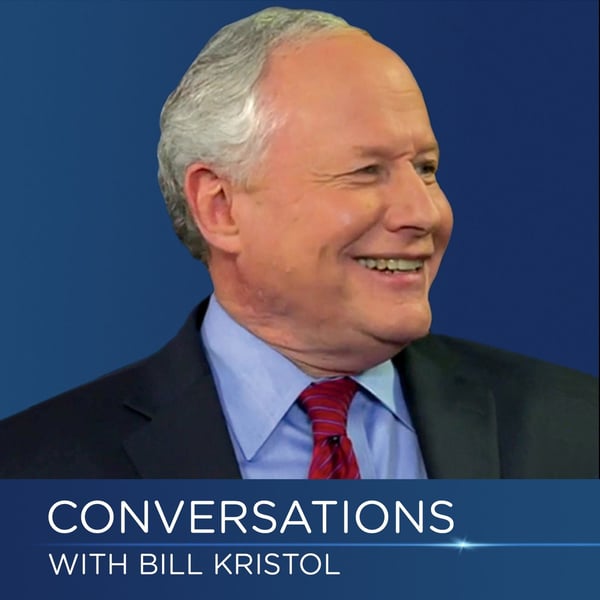Stan Veuger on Inflation, the Economic Outlook, and Public Policies we Need
Conversations with Bill Kristol
Conversations with Bill Kristol
4.7 • 1.7K Ratings
🗓️ 8 June 2022
⏱️ 69 minutes
🧾️ Download transcript
Summary
Transcript
Click on a timestamp to play from that location
| 0:00.0 | Hi, I'm Bill Crystal. Welcome to Conversation. I'm pleased to be joined today. Again, I think for the fourth time, my friends Dan Boyger, the senior fellow in economics at the American Enterprise Institute, |
| 0:26.0 | a specialist in political economy and public finance, but many other fields as well. Contributed, of course, specialized academic journals, peer reviewed and all that, but also contributed to the public presses, stand lectures at Harvard and other universities in Europe and maybe even further a field. So, Stan, thanks for thanks for joining me again today. |
| 0:50.0 | Thank you, Bill. The light is to be back. |
| 0:52.0 | It's good to have you. Our last conversation was in June of May of 2021, I think, and before that June 2020 shortly after the pandemic began and I looked over those and your sense of where things might be going stands up well, you'll be glad to know and in retrospect, but they should begin with that. |
| 1:09.0 | I mean, we've been spent a kind of an amazing two and a half years, a global pandemic that award Ukraine, which is that major economic effects. |
| 1:19.0 | I mean, if you incorporate all that, where are we? Are we better off than you might have expected worse off one of the sort of the big drawing the drawing the telescope back for a minute, what's the big picture before we get into inflation and all the actual work concrete issues. |
| 1:35.0 | Yeah, so I think if we if you go back to the sort of the start of the pandemic period, say May 2020. |
| 1:42.0 | If you compare where we are now to where we expect where we were expected to be now at that time, we're significantly better off in key respects. So in May 2020, CBO expected the unemployment rate to be 8.2% now, right? |
| 1:57.0 | So that's dramatically better. We're basically back at full employment, though labor force participation is a little lower, but we're not at those kinds of skyrocketing unemployment rates. |
| 2:17.0 | In addition, by the end of last year, real GDP, which is the total output of the economy had converged back to where CBO expected the economy to be by the end of 2021 when it made its its final pre pandemic forecast. |
| 2:36.0 | So in January 2020, it made a prediction of where once the economy going to be like the end of 2021, and that's basically where we were at the end of last year. So that's that's quite good. |
| 2:47.0 | So in those two senses, we've completely overcome the pandemic shock. |
| 2:53.0 | Is that true sort of globally or at least in the advanced industrial world generally with that be fair? |
| 2:59.0 | No, so the US is doing significantly better, especially on the output front than other countries. |
| 3:06.0 | Other advanced economies, if you look at the sort of the IMF world economic outlook, other advanced economies are not expected to really return to trend until 2024. |
| 3:16.0 | So the US has really has really caught up a bit faster. |
| 3:20.0 | Of course, in the last few months, things have not gotten better. The war in Ukraine has been very disruptive. |
| 3:26.0 | And the Federal Reserve's response to one of the more negative aspects of where we are to high levels of inflation has also slowed down growth a little bit. |
| 3:36.0 | So we're not doing quite as well as we were doing at the end of last year, but still dramatically better than I think people expected right after the pandemic hit. |
| 3:47.0 | And if your sense of on the on the output front in in May 2020, CBO expected us to be about five and a half percent below trend at the end of 2021. |
| 3:58.0 | And instead we had we had fully caught up. So that's that's the tremendous accomplishment, I think. |
| 4:03.0 | And this is despite not handling the pandemic terribly well, I think was you you stressed in the early conversation. |
... |
Please login to see the full transcript.
Disclaimer: The podcast and artwork embedded on this page are from Conversations with Bill Kristol, and are the property of its owner and not affiliated with or endorsed by Tapesearch.
Generated transcripts are the property of Conversations with Bill Kristol and are distributed freely under the Fair Use doctrine. Transcripts generated by Tapesearch are not guaranteed to be accurate.
Copyright © Tapesearch 2025.

